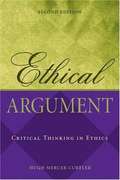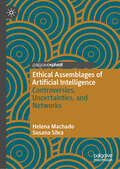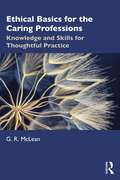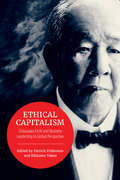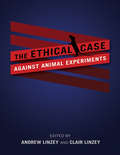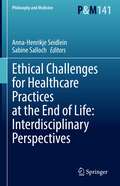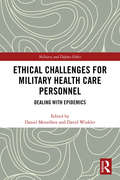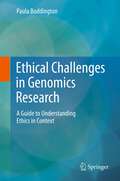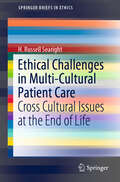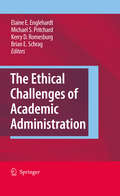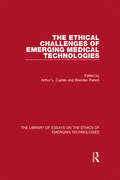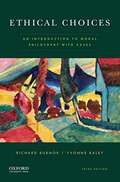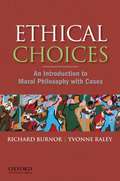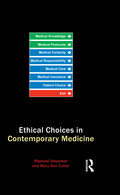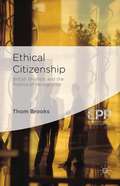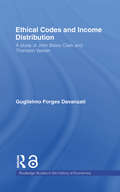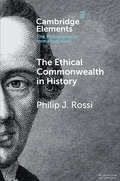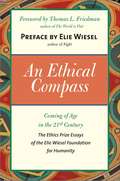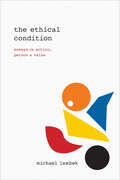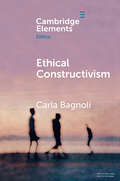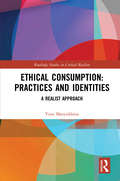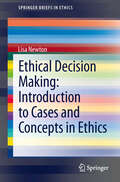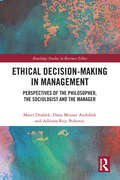- Table View
- List View
Ethical Argument: Critical Thinking in Ethics
by Hugh Mercer CurtlerThis short introduction to ethics bridges the gap between theory and practice. By combining case studies with discussion of theoretical issues, the text introduces students to the most important ethical concepts. The book is an ideal introductory volume for undergraduate students.
Ethical Assemblages of Artificial Intelligence: Controversies, Uncertainties, and Networks
by Helena Machado Susana SilvaThis book critically examines the ethical challenges of Artificial Intelligence (AI), focusing on facial recognition and AI-assisted reproductive technologies. It explores how these issues intertwine with social and political processes and power dynamics in digital societies. What defines ethical versus unethical in the realm of AI? Why do some ethical debates dominate, while others are overlooked? Which actors and institutions align or diverge in these discussions? To address these questions, the authors introduce the concept of "ethical assemblages," offering fresh perspectives on the complexities of AI ethics and their impact on socio-technoscientific structures.
Ethical Basics for the Caring Professions: Knowledge and Skills for Thoughtful Practice
by G. R. McLeanThis book trains students of the caring professions, across health and social care, in the basic philosophical skills and knowledge needed to deal with the ethical aspects of their profession. It shows why ethical education is required, and teaches the skills of reasoning that equip professionals to think critically about the theories and arguments used in ethical discussions. It demonstrates how we can be confident that we can rely on common moral ground; but it also points out how we need to recognise the influence of different world-views, and to note how, on some issues, these can lead us in starkly different directions. It explains relevant philosophical theories, and evaluates their strengths and weaknesses – particularly in relation to what is required for proper professional ethics. It shows how to employ the commonly accepted framework of four ethical principles – beneficence, non-maleficence, autonomy, and justice. These various matters are then illustrated in two extended case studies, which focus on the problem of euthanasia, and the question of screening for disability and the value of human life. Ethical Basics for the Caring Professions is designed for use on all health and social care and human services courses on ethics and values. It will also be of interest to academics and professionals working within these fields.
Ethical Capitalism: Shibusawa Eiichi and Business Leadership in Global Perspective
by Kikkawa Takeo Patrick FridensonShibusawa Eiichi (1840–1931) was a Japanese banker and industrialist who spearheaded the modernization of Japanese industry and finance during the Meji Restoration. He founded the first modern bank in Japan and his reforms introduced double entry accounting and joint-stock corporations to the Japanese economy. Today, he is known as the “father of Japanese capitalism.” Ethical Capitalism is a volume of essays that tackles the thought, work, and legacy of Shibusawa Eiichi and offers international comparisons with the Japanese experience. Eiichi advocated for gapponshugi, a principle that emphasized developing the right business, with the right people, in service to the public good. The contributors build a historical perspective on morality and ethics in the business world that, unlike corporate social responsibility, concentrates on the morality inside firms, industries, and private-public partnerships. Ethical Capitalism is not only a timely work; it is a necessary work, in a rapidly globalizing world where deregulation and lack of oversight risk repeating the financial, environmental, and social catastrophes of the past.
The Ethical Case against Animal Experiments
by Andrew Linzey Clair LinzeyAt present, human beings worldwide are using an estimated 115.3 million animals in experiments ”a normalization of the unthinkable on an immense scale. In terms of harm, pain, suffering, and death, animal experiments constitute one of the major moral issues of our time. Given today's deeper understanding of animal sentience, we must afford animals a special moral consideration that precludes their use in experiments. The Ethical Case against Animal Experiments begins with a groundbreaking and comprehensive ethical critique of the practice of animal experiments by the Oxford Centre for Animal Ethics. A second section offers original writings that engage with, and elaborate on, aspects of the Oxford Centre report. The essayists explore historical, philosophical, and personal perspectives that range from animal experiments in classical times to the place of necessity in animal research to one researcher's painful journey from researcher to opponent. A devastating look at a contemporary moral crisis, The Ethical Case against Animal Experiments melds logic to compassion to mount a powerful challenge to human cruelty.
Ethical Challenges for Healthcare Practices at the End of Life: Interdisciplinary Perspectives (Philosophy and Medicine #141)
by Sabine Salloch Anna-Henrikje SeidleinThis book presents a collection of exclusively selected manuscripts on current ethical controversies related to professional practices from an interprofessional perspective. Insights are provided into the diversity of practices and viewpoints from different countries are merged in a unique way. The book contributes to the debate on social and legal issues regarding end-of-life practices such as organ donation, medically assisted dying and advance care planning. In addition, joint international author groups contributed exclusive chapters about European comparisons on end-of-life topics. The focus on country- and culture-specific aspects broadens the view on key issues and makes the book attractive for an international readership. The variety of approaches and methods used informs and inspires the development of new research and best-practice projects.
Ethical Challenges for Military Health Care Personnel: Dealing with Epidemics (Military and Defence Ethics)
by Daniel Messelken David WinklerThis book examines the issue of ethics in the context of the provision of military health care in an epidemic. Outbreaks of epidemics like Ebola trigger difficult ethical challenges for civilian and military health care personnel. This book offers theoretical reflections combined with reports from recent military and NGO missions in the field. The authors of this volume focus on military medical ethics adding a distinct voice to the topic of epidemics and infectious diseases. While military health care personnel are always crucially involved during disaster relief operations and large-scale public health emergencies, most of the current literature treats ethical issues during epidemics from a more general perspective without taking into account the specifics of the military context. The contributions in this volume provide first-hand insights into some of the ethical issues encountered by military health care personnel in missions during the Ebola outbreak in 2014/2015. This practical perspective is complimented by academic analyses and theoretical reflections on ethical issues associated with epidemics. This book will be of much interest to students of military studies, ethics and African politics.
Ethical Challenges in Genomics Research
by Paula BoddingtonNew developments in science and technology have resulted in shifting ethical challenges in many areas including in genomics research. This book enables those who are involved in genomics research, whether as researcher, participant or policy maker, to understand the ethical issues currently developing in this field and to participate actively in these important debates. A clear account is given of how science and technology are outstripping the capacity of previous ethical regulations to cope with current issues, together with practical illustrations of possible ways forward. Key ethical ideas are presented, drawing on the history of research regulation and on an account of the particular challenges arising in the field of genomics. The book uses a grounded, practical approach to explaining ethical concepts and issues which is geared to enhancing interdisciplinary dialogue. Its broad approach to ethical issues includes relevant considerations from social psychology and there is a particular emphasis on understanding the problems of ethical regulations and practice in the institutional and social context of research. A glossary and numerous text boxes explaining relevant terms and key ideas help to make the work an invaluable resource for both beginners and experts in the field.
Ethical Challenges in Multi-Cultural Patient Care: Cross Cultural Issues at the End of Life (SpringerBriefs in Ethics)
by H. Russell SearightThis book provides an up-to-date description of cross-cultural aspects of end-of-life decision-making. The work places this discussion in the context of developments in the United States such as the emphasis on patient informed consent, “right to die” legal cases, and the federal Patient Self-Determination Act. With the globalization of health care and increased immigration from developing to developed countries, health care professionals are experiencing unique challenges in communicating with seriously ill patients and their families about treatment options as well as counselling all patients about advance medical care planning. While many Western countries emphasize individual autonomy and patient-centered decision-making, cultures with a greater collectivist orientation have, historically, often protected patients from negative health information and emphasized family-centered decision-making. In order to place these issues in context, the history of informed consent in medicine is reviewed. Additionally, cross-cultural issues in health care decision-making are analysed from the perspective of multiple philosophical theories including deontology, utilitarianism, virtues, principlism, and communitarian ethics. This book is a valuable addition to courses on end-of-life care, death and dying, cross-cultural health, medical anthropology, and medical ethics and an indispensable guide for healthcare workers dealing with patients coming from various cultural backgrounds.
The Ethical Challenges of Academic Administration
by Elaine E. Englehardt Kerry D. Romesburg Brian Schrag Michael S. PritchardThis book is an invitation to academic administrators, at every level, to engage in reflection on the ethical dimensions of their working lives. Academics are very good at reflecting on the ethical issues in other professions but not so interested in reflecting on those in their own, including those faced by faculty and administrators. Yet it is a topic of great importance. Academic institutions are value-driven; hence virtually every decision made by an academic administrator has an ethical component with implications for students, faculty, the institution, and the broader community. Despite this, they receive little systematic preparation for this aspect of their professional lives when they take up administrative posts, especially when compared to, say, medical or legal training. Surprisingly little has been written about the ethical challenges that academic administrators are likely to face. Most of the literature relating to academic administration focuses on "leadership" and draws heavily on management and social science theory. The importance of focusing on ethical deliberation and decision-making often goes unrecognized.
The Ethical Challenges of Emerging Medical Technologies (The\library Of Essays On The Ethics Of Emerging Technologies Ser.)
by Arthur L. Caplan Brendan ParentThis collection of essays emphasizes society’s increasingly responsible engagement with ethical challenges in emerging medical technology. Expansion of technological capacity and attention to patient safety have long been integral to improving healthcare delivery but only relatively recently have concepts like respect, distributive justice, privacy, and autonomy gained some power to shape the development, use, and refinement of medical tools and techniques. Medical ethics goes beyond making better medicine to thinking about how to make the field of medicine better. These essays showcase several ways in which modern ethical thinking is improving safety, efficacy and efficiency of medical technology, increasing access to medical care, and empowering patients to choose care that comports with their desires and beliefs. Included are complimentary ethical approaches as well as compelling counter-arguments. Together, the articles demonstrate how improving the quality of medical technology relies on every stakeholder -- not just medical researchers and scientists -- to assess each given technology’s strengths and pitfalls. This collection also portends one of the next major issues in the ethics of medical technology: developing the requisite moral framework to accompany shifts toward patient-centred personalized healthcare.
Ethical Choices
by Richard BurnorIdeal for students with little or no background in philosophy, Ethical Choices: An Introduction to Moral Philosophy with Cases provides a concise, balanced, and highly accessible introduction to ethics. Featuring an especially lucid and engaging writing style, the text surveys a wide range of ethical theories and perspectives including consequentialist ethics, deontological ethics, natural and virtue ethics, the ethics of care, and ethics and religion. Each chapter of Ethical Choices also includes compelling case studies that are carefully matched with the theoretical material. Many of these cases address issues that students can relate directly to their own lives: the drinking age, student credit card debt, zero tolerance policies, grade inflation, and video games. Other cases discuss current topics like living wills, obesity, human trafficking, torture "lite," universal health care, and just-war theory. The cases provide students with practice in addressing real-life moral choices, as well as opportunities to evaluate the usefulness and applicability of each ethical theory. Every case study concludes with a set of Thought Questions to guide students as they reflect upon the issues raised by that case.
Ethical Choices: An Introduction To Moral Philosophy With Cases
by Richard Burnor Yvonne RaleyIdeal for students with little or no background in philosophy, Ethical Choices: An Introduction to Moral Philosophy with Cases provides a concise, balanced, and highly accessible introduction to ethics. Featuring an especially lucid and engaging writing style, the text surveys a wide range of ethical theories and perspectives including consequentialist ethics, deontological ethics, natural and virtue ethics, the ethics of care, and ethics and religion. Each chapter of Ethical Choices also includes compelling case studies that are carefully matched with the theoretical material. Many of these cases address issues that students can relate directly to their own lives: the drinking age, student credit card debt, zero tolerance policies, grade inflation, and video games. Other cases discuss current topics like living wills, obesity, human trafficking, torture "lite," universal health care, and just-war theory. The cases provide students with practice in addressing real-life moral choices, as well as opportunities to evaluate the usefulness and applicability of each ethical theory. Every case study concludes with a set of Thought Questions to guide students as they reflect upon the issues raised by that case. Ethical Choices is enhanced by several pedagogical features. These include summaries at the end of each section, lists of key terms, questions For Reflection and Discussion at the end of each chapter,Guidelines for a Case Study Analysis,and suggestions For Further Reading that include Internet sources. Starred sections indicate more advanced material that may be included at the instructor's discretion.
Ethical Choices in Contemporary Medicine
by Mary Ann Gardell Cutter Raphael Sassower"Ethical Choices in Contemporary Medicine" jettisons the standard medical ethics models of "rights" language and shows how the bioethical problems that receive attention from the media and the public are related to and are explicable in terms of the epistemological foundations of science and medicine. These epistemological concerns include how medical knowledge is established (scientific validity), how medical protocols are administered (checks and balances), how medical certainty is evaluated (probability) and medical responsibility is framed (personal or collective), and how medical knowledge is transmitted (popular media versus professional journals) and how medical care is allocated (insurance policies and government subsides). The book examines the present predicaments of medicine within a broad cultural context and suggests that rational discourse and parochial ethical dialogue may be futile in the face of competing and incommensurable frameworks and agendas, attitudes and wishes. The authors show that, in the postmodern age, two interrelated issues surface when it comes to medicine. On the one hand, there is a strong critique of science and the privileges associated with the scientific discourse and, on the other, there is still a deep-seated quest for certainty in all medical matters.
Ethical Citizenship
by Thom BrooksCitizenship has come under increasing strain in the face of globalization. Our world gets ever smaller while it sometimes seems our borders are becoming ever more closed. What is citizenship and how can it be ethical? Should citizens owe each other special duties denied to non-citizens? How might theories about citizenship impact on our practices? Ethical Citizenship rediscovers a significant and distinctive contribution to how we might understand citizenship today in the first full length examination of this topic. Ethical citizenship is a communitarian relationship between members of a community based around a shared conception of the common good first defended by British Idealists. This book explores its historical roots, contemporary relevance and application to international politics in an engaging work by leading international scholars bringing together theory and practice.
Ethical Codes and Income Distribution: A Study of John Bates Clark and Thorstein Veblen (Routledge Studies in the History of Economics #Vol. 79)
by Guglielmo Forges DavanzatiIn contemporary non-mainstream economic debate, it is widely thought that the functioning of a market economy needs a set of rules (i.e. institutions) which bind agents in their behaviour, allowing efficient outcomes. This idea is contrary to the General Equilibrium Model (GEM) where markets are pictured as working in an institutional vacuum and where social and historical variables play no role. However, in more recent times, a large group of economists have begun to insert social and moral variables into standard models based on the rational choice paradigm, following the increasing interest – on the part of firms – in the possible positive effects of adopting ethical codes. In this key new text Guglielmo Davanzati studies this burgeoning view that ethics and economics can be compatible. Does ‘morality’ affect income distribution? And, if so, what are the effects of the widespread adoption of ethical codes on the functioning of the labour market? Central to Davanzati’s efforts is the thesis that the roots of these new developments can be traced back to the pioneering work of Thorstein Veblen and John Bates Clark. Utilizing their contrasting works, Davanzati’s text illuminates the propagation of ethical codes within the two opposing frameworks i.e. the neoclassical and the institutional. Davanzati’s important book will be an invaluable reference for readers interested in history of economic thought, economics and moral philosophy.
The Ethical Commonwealth in History: Peace-making as the Moral Vocation of Humanity (Elements in the Philosophy of Immanuel Kant)
by Philip J. RossiThe 'ethical commonwealth', the central social element in Kant's account of religion, provides the church, as 'the moral people of God', with a role in establishing a cosmopolitan order of peace. This role functions within an interpretive realignment of Kant's critical project that articulates its central concern as anthropological: critically disciplined reason enables humanity to enact peacemaking as its moral vocation in history. Within this context, politics and religion are not peripheral elements in the critical project. They are, instead, complementary social modalities in which humanity enacts its moral vocation to bring lasting peace among all peoples.
An Ethical Compass: The Ethics Prize Essays of the Elie Wiesel Foundation for Humanity
by Thomas L. FriedmanIn 1986, Elie Wiesel received the Nobel Peace Prize in recognition of his victory over “the powers of death and degradation, and to support the struggle of good against evil in the world.” Soon after, he and his wife, Marion, created the Elie Wiesel Foundation for Humanity. A project at the heart of the Foundation’s mission is its Ethics Prize—a remarkable essay-writing contest through which thousands of students from colleges across the country are encouraged to confront ethical issues of personal significance. The Ethics Prize has grown exponentially over the past twenty years. “Of all the projects our Foundation has been involved in, none has been more exciting than this opportunity to inspire young students to examine the ethical aspect of what they have learned in their personal lives and from their teachers in the classroom,” writes Elie Wiesel. Readers will find essays on Bosnia, the genocide in Rwanda, sweatshops and globalization, and the political obligations of the mothers of Argentina’s Disappeared. Other essays tell of a white student who joins a black gospel choir, a young woman who learns to share in Ladakh, and the outsize implications of reporting on something as small as a cracked windshield. Readers will be fascinated by the ways in which essays on conflict, conscience, memory, illness (Rachel Maddow’s essay on AIDS appears), and God overlap and resonate with one another. These essays reflect those who are “sensitive to the sufferings and defects that confront a society yearning for guidance and eager to hear ethical voices,” writes Elie Wiesel. “And they are a beacon for what our schools must realize as an essential component of a true education.”
The Ethical Condition: Essays on Action, Person, and Value
by Michael LambekWritten over a thirty-year span, Michael Lambek's essays in this collection point with definitive force toward a single central truth: ethics is intrinsic to social life. As he shows through rich ethnographic accounts and multiple theoretical traditions, our human condition is at heart an ethical one--we may not always be good or just, but we are always subject to their criteria. Detailing Lambek's trajectory as one anthropologist thinking deeply throughout a career on the nature of ethical life, the essays accumulate into a vibrant demonstration of the relevance of ethics as a practice and its crucial importance to ethnography, social theory, and philosophy. Organized chronologically, the essays begin among Malagasy speakers on the island of Mayotte and in northwest Madagascar. Building from ethnographic accounts there, they synthesize Aristotelian notions of practical judgment and virtuous action with Wittgensteinian notions of the ordinariness of ethical life and the importance of language, everyday speech, and ritual in order to understand how ethics are lived. They illustrate the multiple ways in which ethics informs personhood, character, and practice; explore the centrality of judgment, action, and irony to ethical life; and consider the relation of virtue to value. The result is a fully fleshed-out picture of ethics as a deeply rooted aspect of the human experience.
Ethical Constructivism (Elements in Ethics)
by Carla BagnoliEthical constructivism holds that truths about the relation between rationality, morality, and agency are best understood as constructed by correct reasoning, rather than discovered or invented. Unlike other metaphors used in metaethics, construction brings to light the generative and dynamic dimension of practical reason. On the resultant picture, practical reasoning is not only productive but also self-transforming, and socially empowering. The main task of this volume is to illustrate how constructivism has substantially modified and expanded the agenda of metaethics by refocusing on rational agency and its constitutive principles. In particular, this volume identifies, compares and discusses the prospects and failures of the main strands of constructivism regarding the powers of reason in responding to the challenges of contingency. While Kantian, Humean, Aristotelian, and Hegelian theories sharply differ in their constructivist strategies, they provide compelling accounts of the rational articulation required for an inclusive and unified ethical community.
Ethical Consumption: A Realist Approach (Routledge Studies in Critical Realism)
by Yana ManyukhinaThis book engages with the topic of ethical consumption and applies a critical-realist approach to explore the process of becoming and being an ethical consumer. By integrating Margaret Archer’s theory of identity formation and Christian Coff’s work on food ethics, it develops a theoretical account explicating the generative mechanism that gives rise to ethical consumer practices and identities. The second part of the book presents the findings from a qualitative study with self-perceived ethical food consumers to demonstrate the fit between the proposed theoretical mechanism and the actual experiences of ethically committed consumers. Through integrating agency-focused and socio-centric perspectives on consumer behaviour, the book develops a more comprehensive and balanced approach to conceptualising and studying consumption processes and phenomena.
An Ethical Critique of Fur Factory Farming (The Palgrave Macmillan Animal Ethics Series)
by Andrew Linzey Clair LinzeyThe fur trade is a multi-million-dollar industry. It is estimated that over 100 million animals are killed in fur farms worldwide annually. This book provides an in-depth analysis of the state of fur factory farming worldwide, and an ethical critique of the main arguments propounded by the fur industry. Consideration is also given to an attempt to justify fur farming through the concept of “Welfur." Andrew Linzey and Clair Linzey argue that from any ethical perspective, fur factory farming fails basic moral tests.
Ethical Decision Making: Introduction to Cases and Concepts in Ethics
by Lisa NewtonThis short introduction to the discipline of Ethics in its practical and professional applications teaches, in simplest form, the discipline's vocabulary and forms of reasoning. It includes illustrative cases, clear explanations of philosophical terminology, and presents decision procedures appropriate to a hierarchy of cases. It is meant to be a foundation for elementary work in Ethics.
ETHICAL DECISION MAKING FOR THE 21ST CENTURY
by Frank G. ForrestThis book is about ethical decision of the 21st Century
Ethical Decision-Making in Management: Perspectives of the Philosopher, the Sociologist and the Manager (Routledge Studies in Business Ethics)
by Matej Drašček Dana Mesner Andolšek Adriana Rejc BuhovacMoral pragmatism has been largely ignored in Business Ethics, despite its natural attraction and the fact that it is prominent in philosophy and socio-economic theories. The main premise of the book is that the complexity of today’s business world does not permit a grand ethical theory, notwithstanding the different attempts made by scientists. Moral pragmatism is the ‘go-to’ approach where the ethical decision-making of managers varies dependent on different circumstances but it always integrates moral considerations. Ethical decision-making is no longer based simply on known rules, but entails the constant dynamic interaction of circumstances, the development of new rules, managers’ past experiences, their knowledge concerning ethics, and skills of moral reasoning. This book interweaves the postmodern approach to management studies and, based on its innovative research, reintroduces moral pragmatism in Business Ethics. The combination of decision-making theories, philosophy and postmodernism paves the way for future novel research in Business Ethics, making it an excellent resource for researchers, academics, and advanced students in the field of Business Ethics. Practitioners, on the other hand, will benefit by improving their skills in ethical decision-making and leadership.
